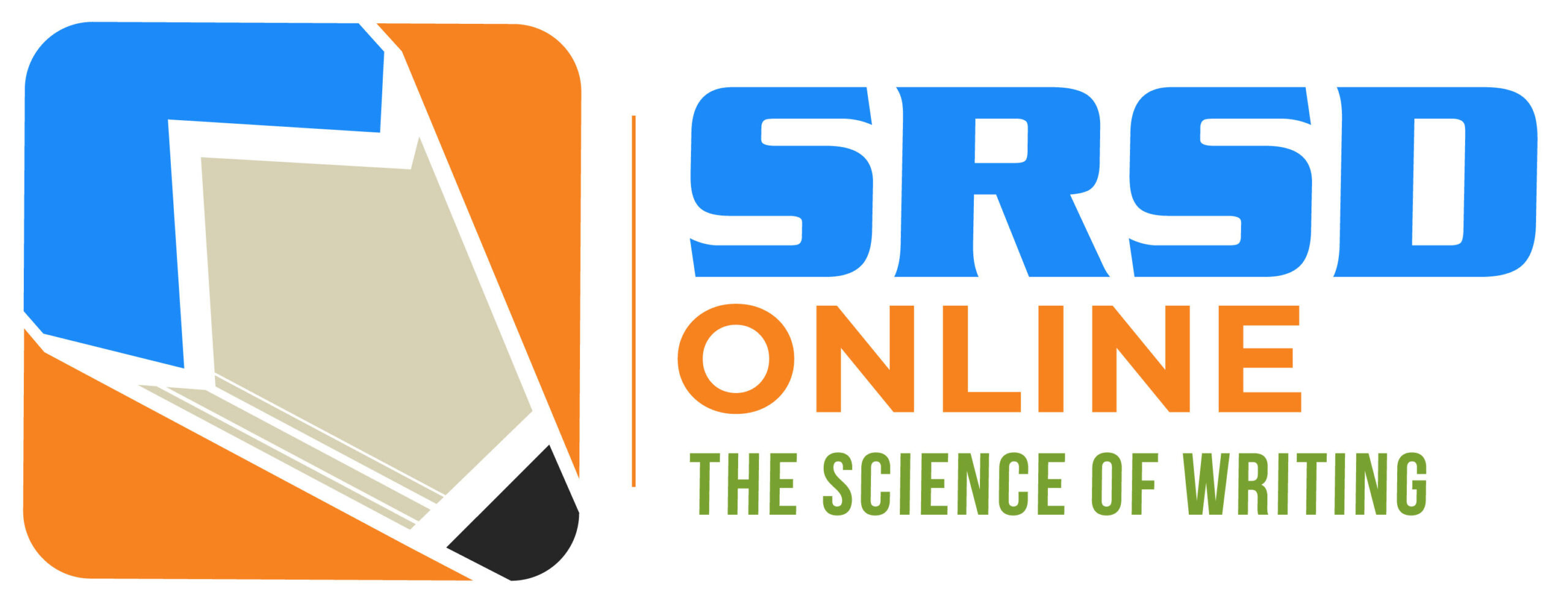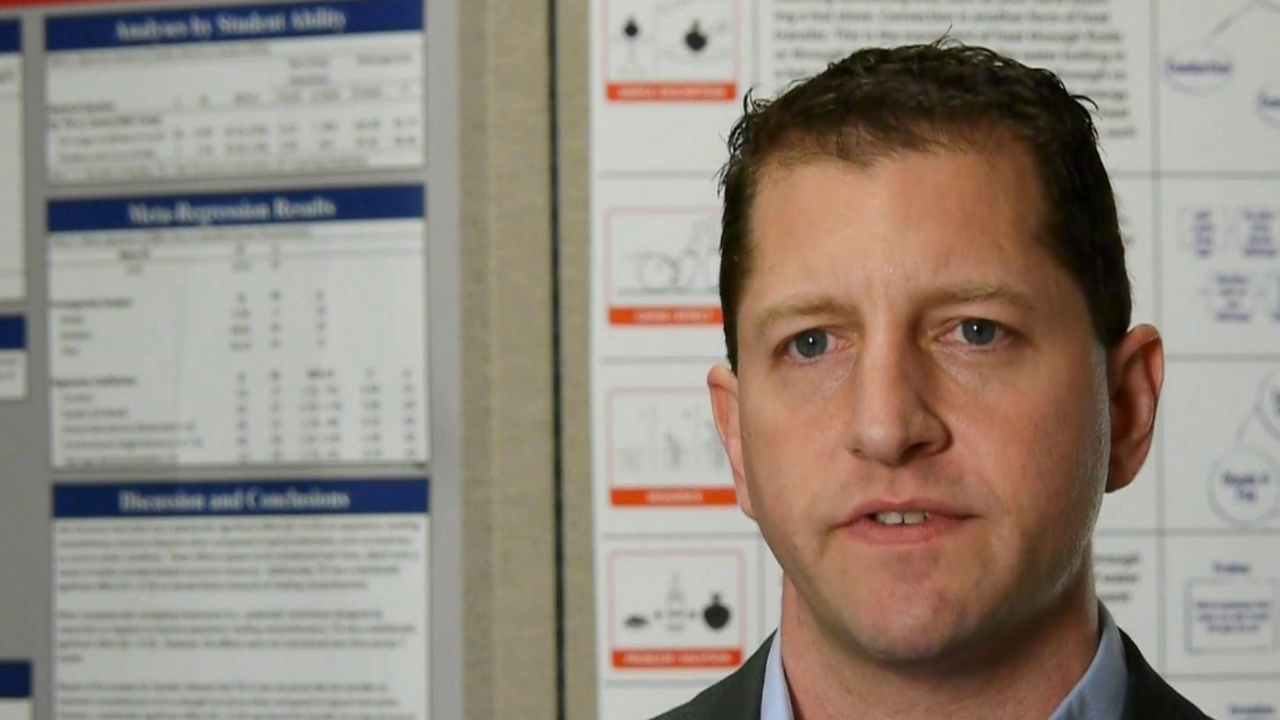SELF-REGULATED STRATEGY DEVELOPMENT
Detailed independent analysis, research, and evidence that SRSD works for all students.
“What we found is that SRSD has the highest effect size of any writing intervention out there.”
– Dr. Debra McKeown
30+ years of research and 100+ international studies
prove that SRSD dramatically boosts effect size in student writing.
1.59
SRSD effect size
VS.
0.34
Traditional writing instruction
What Works Clearinghouse recommendations for SRSD
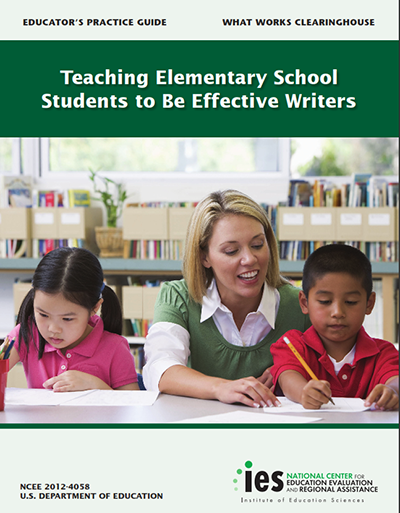
“Strongest Evidence Rating from What Works Website”
IES Educator’s Practice Guide, Institute of Education Sciences

Evidence-based Recommendations for Secondary Students
IES Educator’s Practice Guide, Institute of Education Sciences
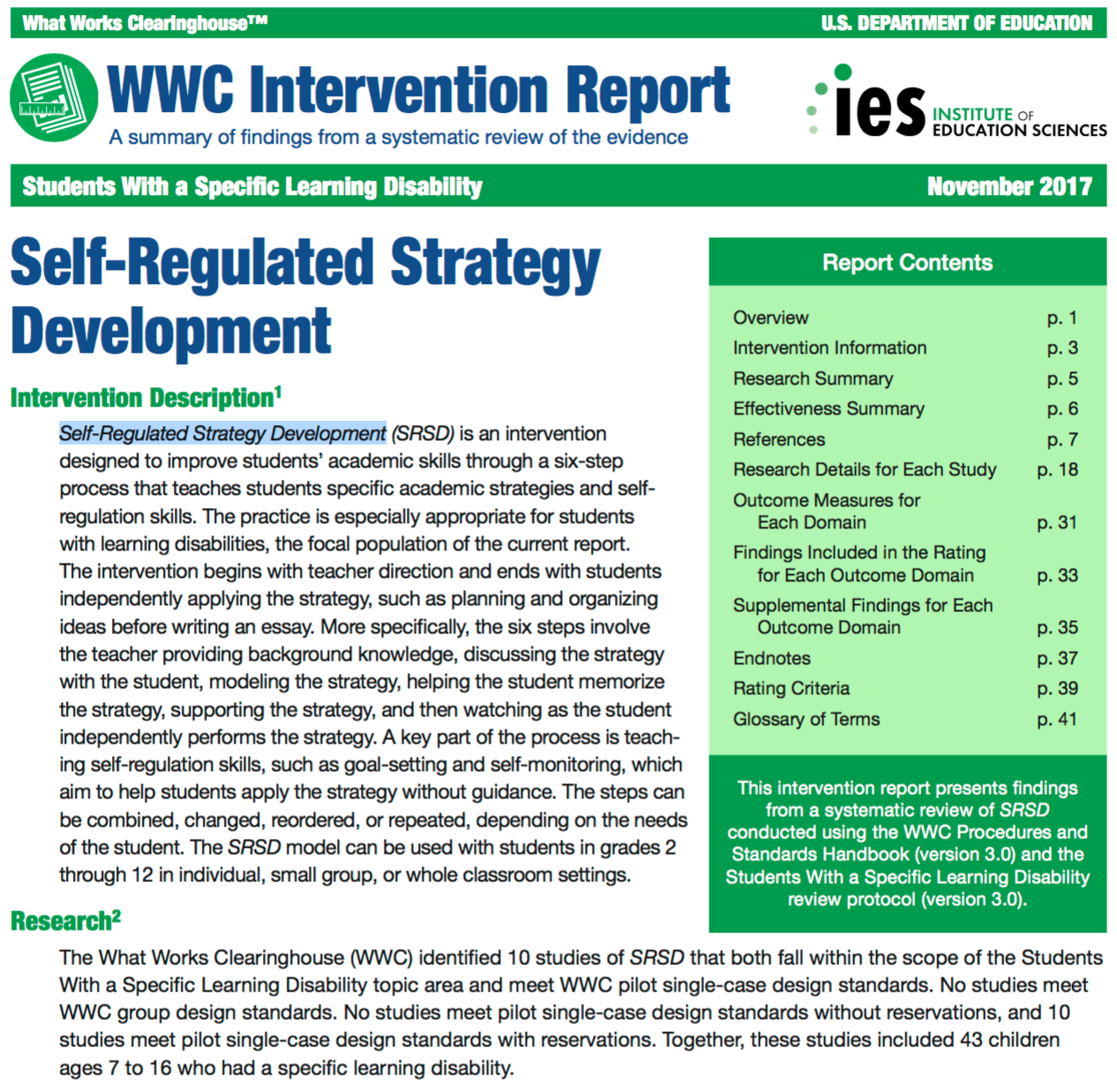
“Self-Regulated Strategy Development (SRSD) is an intervention especially appropriate for students with learning disabilities”
WWC Intervention Report, Institute of Education Sciences
Self-Regulated Strategy Development for Learning Disabilities

Watch Dr. Steve Graham discuss the best strategies for teaching writing
Webinar produced by WWC, Institute of Education Sciences
Researchers speak about SRSD
Love Writing or Hate it by Third Grade 2:37
Dr Karen Harris: Third grade is the turning point for writing.
Highest Effect Size 2:59
Dr. Debra McKowan: Review of all writing research shows SRSD has the highest effect size for all types students
Research Methodology 3:09
Dr. Steve Graham: How the research methodology helped SRSD evolve.
Worth the Effort 1:50
Dr. Michael Hebert, University of Nebraska-Lincoln: Once teachers learn SRSD, teaching writing is easier – less grading and more instruction time.
Top recommendations for SRSD
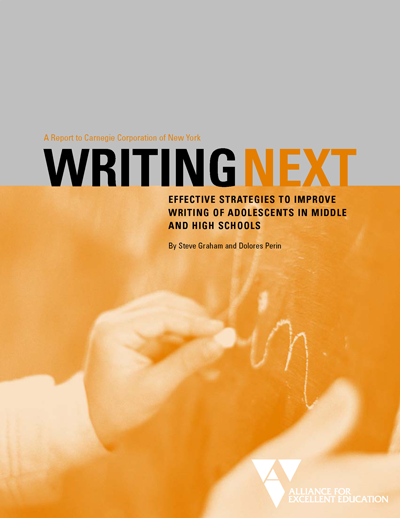
“The single largest effect of any researched approach to writing instruction”
Writing Next, Alliance for Excellent Education, Carnegie Corporation Study 2007

“Strongest Evidence Rating from What Works Website”
IES Educator’s Practice Guide, Institute of Education Sciences
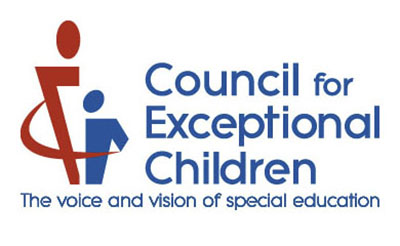
“SRSD is an Evidence-Based Practice”
Teaching Writing to At-Risk Students, Baker, et.al, Exceptional Children, v75 n3 p303-318 Spr 2009
Distinguished team reviewed the state of writing research and analyzed 21 SRSD studies to conclude that SRSD meets the standards for an evidence-based practice.

“From National Center on Intensive Interventions: Strongest Rating for SRSD”
Exceptional Children, Baker, et.al, Exceptional Children, v75 n3 p303-318 Spr 2009
The National Center on Intensive Interventions utilizes Technical Review Committees to establish evaluative standards and review the rigor of the intervention strategies needed to improve outcomes for students who require intensive intervention due to persistent learning and behavior problems. SRSD received the highest ratings on all categories in this study: “SRSD For Writing Strategies”
Detailed analysis of SRSD research findings
Meta-Analysis of the Research Data 1:17
Dr. Karen R. Harris and SRSD for writing researchers recently completed a meta-analyses of all the meta-analyses of SRSD and the news is very good.
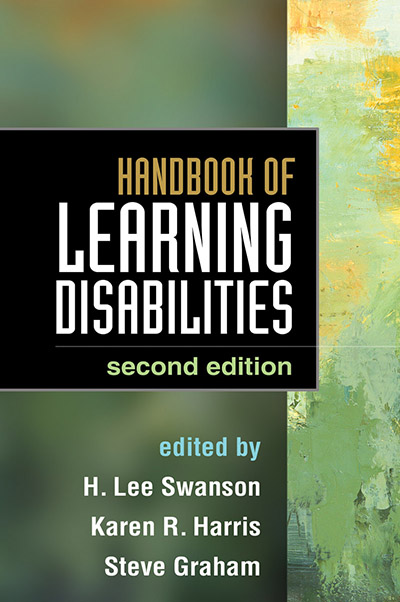
Detailed analysis of SRSD supporting students with learning disabilities (LD). Contributors also identify general principles of effective instruction and review issues in service delivery within response-to-intervention (RTI) frameworks. The book critically examines the concepts and methods that guide LD research and highlights important directions for future investigation.
Latest research: Expanding the scope of SRSD
Evidence-Based Practice
Harris, K.R., & Graham, S. (2016). Self-regulated strategy development in writing: Policy implications of an evidence-based practice. Policy Insights from the Behavioral and Brain Sciences.
“In this invited article, we were able to argue for support for EBPs, including SRSD. We were also able to address some of the misrepresentations of SRSD by some theoretical groups. We also addressed the importance of deeply understanding genres in the development of our strategies for SRSD, as Steve has led this work since the 1980’s. His careful study of expert writers across genres and writing in general underlies all of the strategies we have developed since 1980, combined with our work in classrooms (with many of you) to determine age and grade appropriate genre goals. Many others have similarly studied genre demands in both reading and writing to create their own unique strategies, which they have since validated (too many to name, but this includes reading and writing as well as writing for math learning by folks such as Bob Reid, Linda Mason, Sue De La Pz, Sahrlene Kiuhara, Debra McKeown, Mary Brindle, Pooja Patel, Leslie Laud, and many more).”
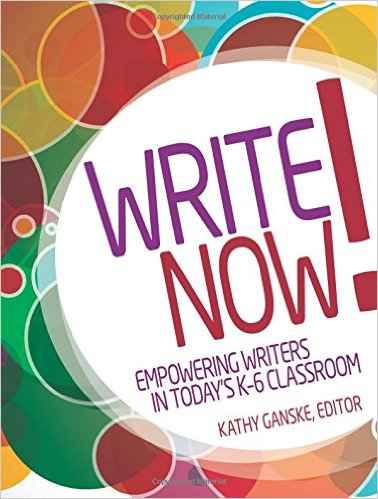
Writing strategies for the use of informative text
Turning broccoli into ice cream sundaes: POW+TREE+TWA. Self-regulated strategy development for persuasive writing using informational text.
Our current research has validated an integrated set of reading and writing strategies modified for upper elementary students learning to write persuasively about a topic with the use of source text, as required at these grade levels by CCSS.
One single case study and one randomized controlled trial have been completed with struggling 4th-6th grade writers (scoring below the 25th percentile on a norm referenced measure). Students’ use of source text and their persuasive writing improved meaningfully in these studies, and students enjoyed learning and using the strategies, POW+TREE+TWA.
Excellent SRSD results in the UK
Education Endowment Foundation 2 year study in 23 schools show significant results.
Research on professional development for SRSD
The studies below found that an approach referred to as Practice-Based Professional Development had significant and meaningful effects on teachers and on students’ writing outcomes.
Harris, K.R., Graham, S., & Atkins, M. (2015). Tier 2, Teacher-implemented writing strategies instruction following practice-based professional development. Contemporary Educational Psychology.
Harris, K.R., Lane, K., Driscoll, S., Graham, S., Wilson, K., Sandmel, K., Brindle, M., Schatschneider, C. (2012). Tier 1, teacher-implemented self-regulated strategy development for students with and without behavior concerns. Elementary School Journal, 113, 160-191.
Harris, K.R., Lane, K., Graham, S., Driscoll, S., Sandmel, K., Brindle, M., & Schatschneider, C. (2012) Practice-based professional development for strategies instruction in writing: A randomized controlled study. Journal of Teacher Education, 63, 103-119.
Festas, M.I., Oliveira, A.L., Rebelo, J.A., Damião, M., Harris, K.R., & Graham, S. (in press). Professional development in self-regulated strategy development: Effects on the writing performance of eighth grade Portuguese students. Contemporary Educational Psychology, 40, 5-16.
McKeown, D. (2012). Examining the effects of practice-based professional development and coaching on the differentiation of SRSD writing instruction (Unpublished doctoral dissertation). Vanderbilt University, Tennessee.
Additional selected research
Over 100 studies Across Countries and Cultures 1:26
Dr Karen Harris, Mary Emily Warner Professor, Arizona State University: Writing is now getting to center stage.
Santangelo, T., Harris, K.R., & Graham, S. (in press). Self-regulation and writing: An overview and meta-analysis. In C. MacArthur, S. Graham, & J. Fitzgerald (Eds.), Handbook of Writing Research (Volume 2). NY; Guilford.
Graham, S., Harris, K.R., & Olinghouse, N. (2007). Addressing executive function problems in writing: An example from the self-regulated strategy development model. In L. Meltzer (Ed.), Executive functioning in education: From theory to practice (pp. 216-236). New York: Guilford.
Harris, K.R., Graham, S., Chambers, A., & Houston, J. (2014). Turning broccoli into ice cream sundaes: Self-regulated strategy development for persuasive writing using informational text. In Gansky, K. (Ed.), Write now! Empowering writers in today’s K-6 classrooms (pp. 87-111). Newark, DE: International Reading Association.
Harris, K.R., & Graham, S. (2013). Integrating reading and writing instruction In B. Miller, P. McCardle, & R. Long (Eds.), Teaching reading and writing: Improving instruction and student achievement (pp. 35-44). Baltimore, MD: Paul H. Brookes Publishing Co.
Harris, K.R., Lane, K.L., Graham, S., Driscoll, S., Sandmel, K., Brindle, M., & Schatschneider, C. (2012). Practice-based professional development for self-regulated strategies development in writing: A randomized controlled study. Journal of Teacher Education.
Harris, K. R., Graham, S., Brindle, M., & Sandmel, K. (2009). Metacognition and children’s writing. In D. Hacker, J. Dunlosky, & A. Graesser (Eds.), Handbook of metacognition in education (pp. 131-153). Mahwah, NJ: Erlbaum. Includes an updated meta-anlaysis of SRSD research as well as a review of the role of metacognition in writing.
Harris, K., Santangelo, T., & Graham, S. (2010). Metacognition and strategy instruction in writing. In H.S. Waters & W. Schneider (Eds.), Metacognition, strategy use and instruction (pp. 226-256). NY: Guilford.
Harris, K.R., & Graham, S. (2008). Self-regulated strategy development in writing: Premises, evolution, and the future. British Journal of Educational Psychology, Monograph Series II, 6, 113-136.
Harris, K. R., Graham, S., & Mason, L. H. (2006). Improving the writing performance, knowledge, and motivation of struggling writers in second grade: The effects of self-regulated strategy development. American Educational Research Journal, 42, 295–340.
Lane, K., Harris, K.R., Graham, S., Driscoll, S., Sandmel, K., Morphy, P., Hebert, M., & House, E. (2012). The effects of self-regulated strategy development for second-grade students with writing and behavioral difficulties: A randomized controlled trial. Journal of Research on Educational Effectiveness, 63 (2), 103-119.
Rogers, L., & Graham, S. (2008). A meta-analysis of single subject design writing intervention research. Journal of Educational Psychology, 100, 879 – 906.
Harris, K.R., Lane, K.L., Graham, S., Driscoll, S., Sandmel, K., Brindle, M., & Schatschneider, C. (2012). Practice-based professional development for self-regulated strategies development in writing: A randomized controlled study. Journal of Teacher Education, 63 (2), 103-119.
EDUCATOR STORIES
1000’s of teachers are experiencing unprecedented writing and excelled learning results using Self-Regulation Strategy Development (SRSD). Additionally, SRSD success is cumulative and achieves generalization to other disciplines. Here are just a handful of our SRSD stories.
